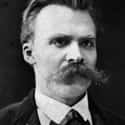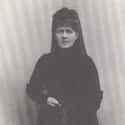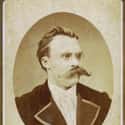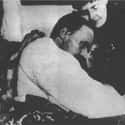-
(#3) Nietzsche Retired In His Thirties And Lived Out Of A Suitcase
For most of his life, Nietzsche was plagued by various maladies, both real and possibly imagined. He was most profoundly affected by incapacitating headaches, poor digestion, and nausea. The fact that he had extremely poor eyesight to the point of veritable blindness also did not help his constitution. These afflictions would frequently interrupt his professional life, and led to days of bed rest and isolation.
Finally, these chronic conditions forced Nietzsche to resign from his professor's chair on May 2, 1879. Through an intervention by the department chairman, he would go on to receive a pension equal to roughly two thirds of his annual salary for a period of six years. This would eventually be extended and would be paid to him up until 1897, when his sister Elizabeth requested it be halted. Nietzsche used this stipend to travel in a perpetual circle between southern France and Italy in the winter and Switzerland and Germany in the summer, living in rented rooms and boarding houses while working on a succession of manuscripts.
-
(#7) His Sister Married An Anti-Semite And Then Attempted To Establish A German Colony In Paraguay
Nietzsche's relationship with his only sibling, Elizabeth, was always volatile and quite hostile. He openly quarreled with her during his abortive relationship with Lou Salome - Elizabeth believing from the beginning that Salome was insincere and exploitative. He considered Elizabeth to be his intellectual inferior, and part of his perpetual wandering throughout Europe was based in his reluctance to spend time with either his sibling or his mother:
"I don’t like my mother and it’s painful even for me to hear my sister’s voice."
His aversion only became greater when Elizabeth became romantically involved with one of Germany's most notorious anti-Semites of the day, Bernhard Foerster. Though he was still on speaking terms with his sister at the time, Nietzsche refused to come to the couple's wedding or give his blessing. By then, Foerster and Elizabeth had become intent upon establishing a German colony in Paraguay called "Nueva Germania," where only couples considered to be racially pure were to be admitted. Founded in 1887, the colony would rapidly collapse after Foerster's suicide and Elizabeth's hasty sale of any assets before her return to Germany in 1893. However, some of the descendants of the "Nueva Germania" colony still live in the town today.
-
(#4) In 1889, Nietzsche Had A Psychotic Break And Never Wrote Anything Again
On January 3, 1889, two policemen in the city of Turin, Italy approached a disturbance in the Piazza Carlo Alberto. They apprehended a man who had allegedly broken down after witnessing the flogging of a horse. The man was so overcome at witnessing this brutality that he ran up and threw his arms around the animal, attempting to stop the beating. He subsequently collapsed unconscious onto the pavement.
Identified as Friedrich Nietzsche, a German living in a nearby rooming house, his landlord was located and the afflicted man was carried back to his room. Although it would take days for Nietzsche's friends and relatives to become aware of his condition, the philosopher's mental prognosis would remain unchanged until his death in 1900, and he would not say or write anything intelligible for the rest of his life.
-
(#1) Nietzsche Became A Professor At The Age Of 25 - An Unheard Of Achievement
Friedrich Nietzsche was appointed as a full professor of philology at the University of Basel at the age of 25. In the fall of 1868, Nietzsche's professor and mentor at the University of Leipzig, Friedrich Ritschl, had recommended Nietzsche for a vacancy at the University of Basel, despite the fact that Nietzsche had not yet finished his doctoral studies.
The University of Basel conferred the degree sight unseen based on Ritschl's glowing review; Nietzsche began teaching right away in the summer of 1869 and was quickly promoted to a full professorship - a rather remarkable accomplishment.
-
(#11) Nietzsche Died In 1900, 33 Years Before Hitler Became Politically Powerful
Friedrich Nietzsche died three years after he was moved from his mother's home in Naumburg to his sister's home in Weimar - the same house that would eventually contain the Nietzsche Archive. This was 23 years before Hitler would become politically relevant, and 33 years before he would officially gain control of the German government.
Nevertheless, Nietzsche has been irreparably associated with the anti-Semitic ideologies of Hitler and the Nazis. Following World War II and the partition of Germany, the director of the Nietzsche Archive was disappeared into a Soviet gulag and Nietzsche's works were officially banned in the Iron Curtain countries, including East Germany. It was not until reunification in 1991 that the Archive was reopened and Nietzsche's works became available in the region where the philosopher was raised. One final indignity that has not yet been rectified was the reburial of Nietzsche following the death of Elizabeth in 1935. His coffin was removed from its prominent place between his two parents and placed nearby, while Elizabeth was buried and remains in the more high profile position.
-
(#8) Nietzsche's Sister Stole His Copyrights And Distorted His Beliefs
One of the reasons that Elizabeth Nietzsche so hastily returned to Germany was because of the increased attention suddenly being paid to her now incapacitated brother's writings and philosophy. She elbowed her mother and other relatives out of the way and got her herself appointed as the legal custodian of his copyrights and legal affairs. She published a two-volume, self-aggrandizing biography that minimized the break with Wagner, Nietzsche's dislike of German nationalism, and his contempt for religion and Christianity. She also published The Will to Power, ostensibly written by her brother but carefully crafted by Elizabeth to espouse and validate her own right-wing, militaristic perspective.
When Nietzsche's mother died in 1897, Elizabeth transported her brother to Weimar and exploited him to raise money for a "Nietzsche Archive." She eagerly promoted her brother as being philosophically wedded to the nationalist, anti-Semitic attitudes that would sweep through Germany during the beginning of the twentieth century - a promotion that conformed to her own beliefs but also generated a great deal of money.
New Random Displays Display All By Ranking
About This Tool
Friedrich Nietzsche was the most famous philosopher and poet of the 19th century who had a great influence on the development of philosophy. H literature works have provided extensive criticism and discussion in the fields of religion, philosophy, and science, etc. At the age of 24, he already became a professor of classical literature in the German-speaking of the University of Basel, specializing in ancient Greek and Latin literature.
Unfortunately, he resigned due to health problems in 1879 and has been suffering from mental illness ever since, he breakdown in 1889 has never recovered. He firmly affirmed the value of humans and the importance of independent thinking but failed to overcome mental illness. The random tool introduced 12 details about his miserable but fascinating life.
Our data comes from Ranker, If you want to participate in the ranking of items displayed on this page, please click here.
















